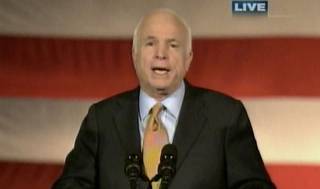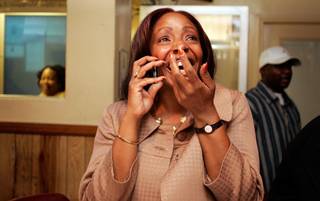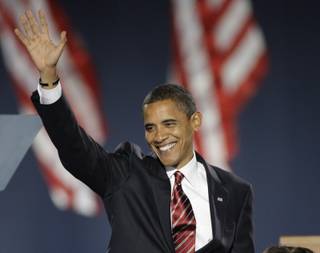Thursday, Nov. 6, 2008 | 2 a.m.
Election Night 2008

Viewing video requires the latest version of Adobe's Flash Player
Sun Topics
Never mind the “Bradley Effect,” pollsters in Nevada may now have to consider the “Obama Effect.”
Even as poll forecasts provided accurate predictions in other states Tuesday, the president-elect did much better in Nevada than most polls showed he would.
“Whatever they’re doing here isn’t working,” said Dan Hart, a Nevada political consultant who’s been examining polling data for three decades.
Pollsters on Wednesday suggested the errors in Nevada came from a combination of one or more factors:
a uniquely strong Obama organization that turned out voters in unprecedented numbers, bad estimates by pollsters of the likelihood that certain voters, especially those new to the political process, would indeed cast ballots, and the inability of pollsters to speak with Nevadans who own mobile phones but not land lines.
Obama won Nevada by 12 percentage points when most polls had him with leads much smaller.
The final poll of the Las Vegas Review-Journal, conducted by Mason-Dixon Polling & Research, had Obama winning 47 percent to 43 percent, which wasn’t terribly dissimilar to other public polling. Brad Coker, the firm’s managing partner, did not return a call seeking comment.
As Hart noted, the problem seems isolated to Nevada, as pollsters — including Mason-Dixon — did fairly well in most other places.
The Bradley Effect refers to former Los Angeles Mayor Tom Bradley, who was leading in polls going into the 1982 California governor’s race, only to lose. Some political scientists theorized that voters lied to pollsters, saying they were supporting Bradley, because they didn’t want to be viewed as racists for not doing so, even though in the privacy of the voting booth, they had no intention of casting a ballot for him.
Pollsters and other political observers Wednesday were considering the reasons for the Obama Effect in Nevada.
They think pollsters screened out too many voters who didn’t seem likely to turn out, or missed new voters whose phone numbers weren’t publicly available. This seems especially true in the Hispanic community, where Obama won by a huge margin and voters turned out in numbers never before seen.
Another potential factor: The Obama ground game, which expertly hunted for veritable diamonds in the rough, turning out voters in a way pollsters were unable to account for.
“It’s the ground game,” said Jennifer Duffy, an analyst for the nonpartisan Cook Political Report.
She also noted that public polling companies will often do only the minimum required so they can contain costs.
Mark Blumenthal, a longtime Democratic pollster and editor of Pollster.com, said he was intrigued that the other state where pollsters underestimated Obama support was New Mexico. As he noted, the two states have some things in common: Both Western, both heavily Hispanic.
Blumenthal pointed to what he called “the uncertain,” not just people uncertain who they were supporting, but people uncertain whether they were voting. If they were uncertain about whether they would vote, pollsters almost certainly wouldn’t use them in a pool of likely voters.
The uncertains made up nearly 10 percent of the voting populace in late September and tended to be younger and less educated, according to polling, and the Obama ground game may have swept them up with its persistence.
Latinos could have been underrepresented in Nevada polls for a number of reasons, including language, their relative youth and the “cell phone problem,” said Scott Keeter, director of survey research for the Pew Research Center.
“Clearly, the way you decide who you’re going to let into your likely-voter universe makes a difference,” he said.
Hispanics were a major factor here, voting overwhelmingly for Obama. According to exit polls, they made up 15 percent of the electorate, up from 10 percent in 2004. The Culinary Union, whose membership is 40 percent Hispanic, ran an aggressive field program aimed at turning out its 60,000 members and those of other minority-heavy service unions.
Another issue in Nevada: A transient population that tends to move around a lot within the state and has unlisted numbers.
As Hart noted, pollsters once randomly called digits. Then they randomly called digits in certain exchanges. Then they went to certain lists. With every narrowing of potential numbers called, the true randomness of the sample was threatened.
Obama’s decisive Iowa victory was the first indicator the Democrat was changing the electoral equation.
Days before the state’s caucus, the Iowa Poll found Obama leading Sen. Hillary Clinton by 7 percentage points. The results were predicated on the finding that a record number of independents planned to participate. Clinton’s campaign, along with that of former Sen. John Edwards, blasted the poll, saying it flew in the face of conventional wisdom — and their own polls.
Obama won by 8 percentage points.
J. Ann Selzer, whose firm contracts with the Des Moines Register to run the highly respected Iowa Poll every four years, said unlike other pollsters, who use turnout models to define likely voters, she uses random dialing.
“A turnout model says ‘I have clairvoyance,’ ” she said. “It prevents you from seeing change when there is change. If you use tools of the past, you miss what’s happening today.”




Join the Discussion:
Check this out for a full explanation of our conversion to the LiveFyre commenting system and instructions on how to sign up for an account.
Full comments policy